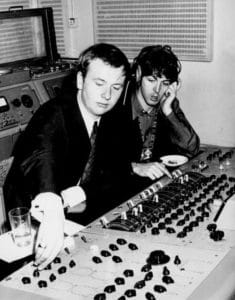Knowing Emerick was fascinated by records (ever since finding his grandmother’s stack of Gramophone disks when he was 6), a schoolteacher told him about a job opening at a nearby recording studio. The boy — he was just 15 — jumped on it, and got the job. On his second day at work, a virtually unknown band that just got a new drummer came in to record their first release, and Emerick got to sit in to learn the job. The year: 1962. The new drummer: Ringo Starr. The band: The Beatles. And the song: “Love Me Do” — which was a smash hit that helped launch the group to stardom. Oh, and the North London studio? EMI, which is now known as the Abbey Road Studios. In spring 1966, Beatles producer George Martin requested Emerick be the band’s lead engineer, starting with the album Revolver.

To get the sound the band wanted, Emerick at times had to break EMI’s “rules” — like daring to close-mic Starr’s drums. When not working with The Beatles, Emerick recorded other artists, including Manfred Mann, Cheap Trick, and Supertramp. In 1969, Paul McCartney hired Emerick away from EMI to be the lead engineer for Apple Corps, and supervise the building of the company’s own Apple Studio. Once The Beatles broke up, Emerick continued as McCartney’s engineer. Emerick received four Grammy Awards: for his engineering work on the Sgt. Pepper’s Lonely Hearts Club Band and Abbey Road albums and on McCartney’s Band on the Run, and a Technical Achievement Award given to those who have “dramatically pushed the boundaries” of the field. Emerick “and George Martin could sit and not say anything throughout a whole session and people would think they were very weird,” McCartney once said. “It was just that they read each other. It was the same thing with me and John.” McCartney said Emerick “was smart, fun-loving, and the genius behind many of the great sounds on our records.” He died October 2 at his California home from a heart attack, at 72.
